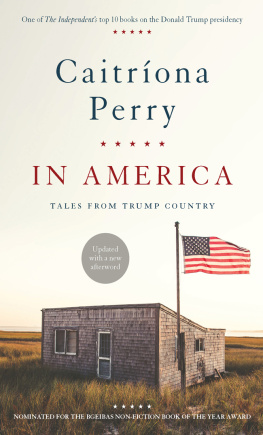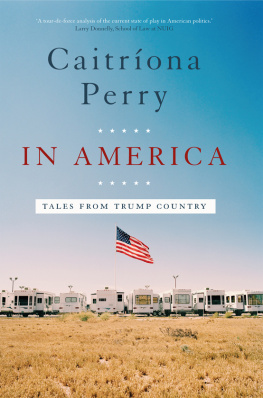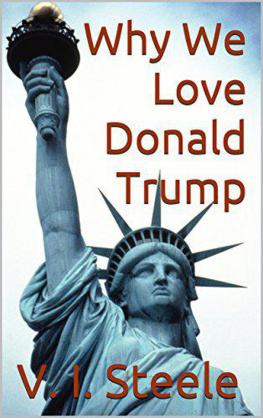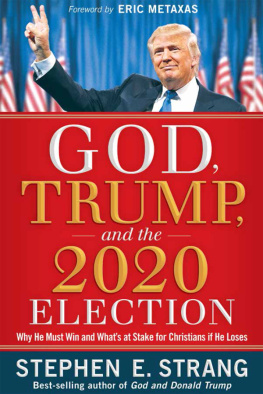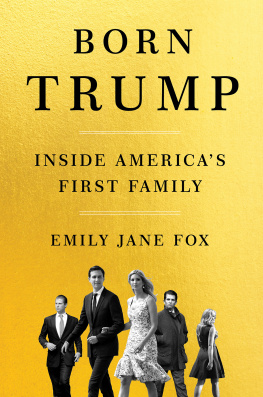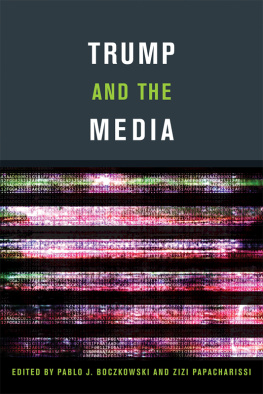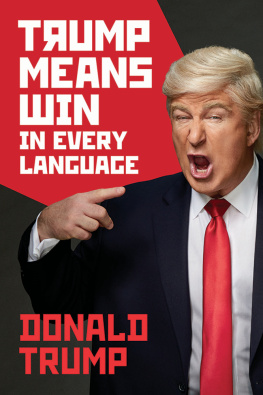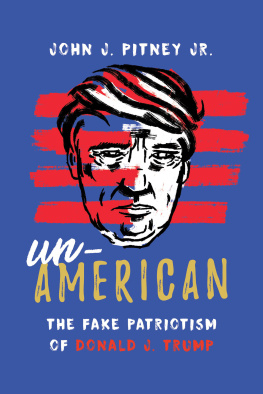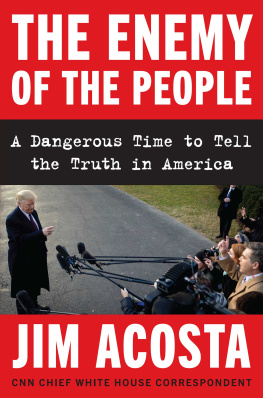In America
TALES FROM
TRUMP COUNTRY
Caitrona Perry
Gill Books
Rx.
Contents
PREFACE
T ucking into a breakfast of shrimp and grits and stewed peaches on cinnamon-sugar-crunchy French toast, this former police chief and his wife are celebrating their fortieth wedding anniversary. Their three daughters chipped in to send them off for a night in this beautiful pre-American Revolution fort that is now a romantic, cosy inn in the middle of Mobile, Alabama.
Communal breakfast tables in romantic, cosy inns often make my heart sink. Sometimes the last thing you want to do first thing in the morning is talk to strangers. But more often than not, though, random chatter can turn up the most interesting nuggets of information.
Its not long after the 2016 presidential election so the conversation inevitably turns to the incoming forty-fifth president, Donald John Trump. Theyre diehard Republicans so naturally they voted for him. He wasnt their first choice, though. During the primary season they had favoured Ben Carson, the retired neurosurgeon with a colourful past, a man who was the butt of many of Trumps jokes at one time but later became a faithful supporter and is now Housing and Urban Development Secretary.
Discussing some of Trumps more controversial statements, they say not all of his tastes are their tastes. Theyre God-fearing people and have raised three professional daughters. They were always going to vote for the Republican candidate on the ticket, but they particularly like his position on the economy, and that hes pro-life, pro-guns and, most importantly, pro-Israel. Im curious why they would rank his position on Israel so highly. Is the PalestinianIsraeli conflict such a hot topic so far down in the Deep South? No, their position is motivated by their love of the Bible, they say. They tell me they are Christians, and they believe that the Bible says all Christians should protect Israel no matter what. Trump says he will firmly support Israel and even wants to move the US embassy to Jerusalem something no other country has done so they are supporting him even though, as Christians, they dont like everything he stands for.
Its the first time Ive heard such an argument from an American voter explaining their reasons for voting for Trump. But it shows how diverse America is. It is more akin to the European Union than it is to one particular country. You dont have to travel far in this vast nation to find yourself in a different land, where the food is different, the architecture is different, the climate is different, the industry is different, the language is different, the racial make-up is different, the attitude is different. And that is where the political problems come from. A strong argument can be made that the two-party system does not serve America well. It did not serve them well in picking the two candidates in 2016 they had the lowest favourability ratings of any candidates ever going into polling day. It does not serve them well in attempting to put together a House and a Senate that serve all of the interests of all of the people and can actually pass legislation. And it left the door open for Trump, a man who was essentially an independent candidate running under the banner of the Republican Party just as Bernie Sanders was an independent candidate running under the banner of the Democratic Party.
Without Barack Obama there would not have been a Donald Trump the celebrity president, the unique president, the change candidate. Obamas successful argument in 2008 that people needed a break from the norm, that they should take a chance on him and come together, with people power, to change the nation, is a notion that Donald Trump piggy-backed on. Trump was viewed as the change candidate this time around; Hillary Clinton was the establishment candidate.
One of my predecessors in the role of RTs Washington correspondent, Carole Coleman, may not have realised how prescient she was when she wrote in her 2008 book about what had brought about Barack Obamas election: Americans are ready for a new era of leadership. They are tired of mounting bills and stagnant wages, alarmed by illegal immigrants overwhelming their schools and hospitals, weary of war and being unloved abroad, and troubled by the increasing cost of health care and plummeting value of their homes.
All of these statements were still true of many Americans who went to the polls in November 2016. Except no matter how weary they had been in 2007 and 2008, they were even more so in 2016. More tired, more fed up. Theyd given a chance to a traditional politician, to a Democrat, and that hadnt worked for them, so why not give a chance to an outsider? This manifested itself from the outset for both parties. Democrats, and some independent voters, suddenly found themselves drawn to Bernie Sanders a long-time socialist who registered as a Democrat for the purposes of contesting the election. Republicans and other independent voters found themselves drawn to the other outsider candidate, Donald Trump.
Political commentators, and the Republican and Democratic party faithful alike, felt their heads spin on the night of 8 November 2016 as it became apparent that Donald Trump, the self-proclaimed billionaire businessman from a privileged background in New York, was on his way to becoming the forty-fifth president of the United States.
That shockwave rippled through much media coverage, in the US and abroad, and indeed in my own organisation, RT, Irelands public-service broadcaster. Researching this book, revisiting voters, rereading articles and polls, its struck me that the world had been needlessly blindsided by the showmanship of Donald Trump. In many places the changing tide was there to see if people had looked closely enough. I felt the pull of the water when travelling around some of the states that Trump ultimately won and had been saying privately for about nine months that I thought it was possible he would do it, only feeling brave enough to say so on air about a week before his election. A reporters gut instinct is something, but its not enough to combat the seemingly strong argument of electoral-college maths equations and polls that were trending almost completely in one direction. There was no evidence other than the anecdotal evidence I was witnessing first hand. Report on the facts, not a feeling is my creed.
I brought those voices and those stories to the people of Ireland (and further afield, thanks to the Internet) during 2015 and 2016. I felt an obligation to inform our audience of the opinions of voters that didnt coalesce with the pro-Democrat, pro-Clinton viewpoint that colours much of Western European political discourse. I was trying to remind people that in a two-horse race there is always a reasonable chance the so-called dark horse will win. Perhaps I succeeded a little; perhaps I failed miserably. If youre an eagle-eyed viewer of the RT news, youll have seen or heard from some of the characters on the following pages. Others are people I met in the course of my professional and personal travels. Some are people Ive met since the election, as I returned to the key states in 2017 in my efforts to further understand what is happening right now in America. I asked everyone I met, respectfully, whom they had voted for. Most people told me honestly because Im a foreigner, and although Im a journalist, I dont work for a large US television network.
It is because I dont work for a large US television network that, in late June 2017, I found myself in the most unusual situation of my career to date the subject of international attention and discourse following an encounter in the Oval Office with President Trump. In case you were tuned out of the constant Trump News Stream in the last week of June 2017, heres a quick recap of what happened: President Donald Trump was to have his first official phone call with the newly elected Taoiseach (Prime Minister) of Ireland, Leo Varadkar.

